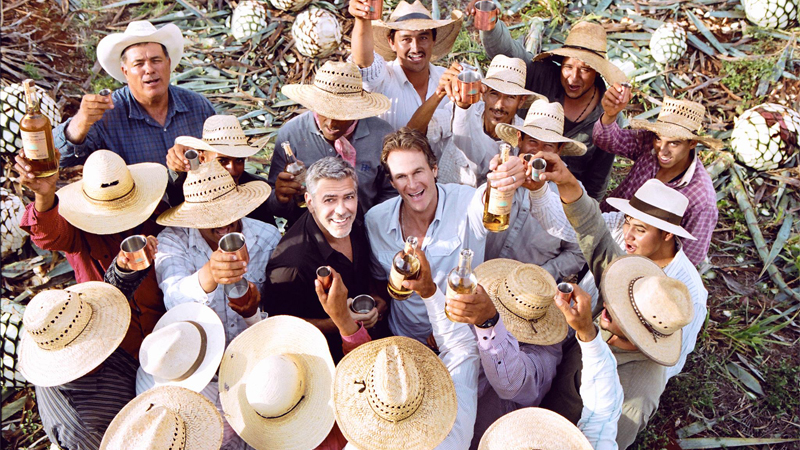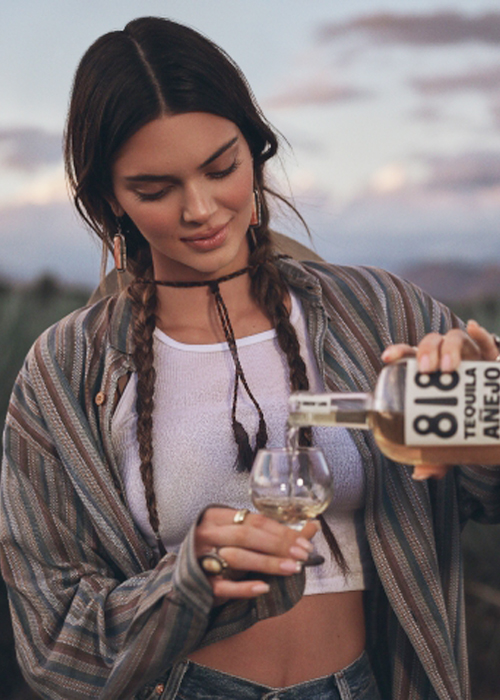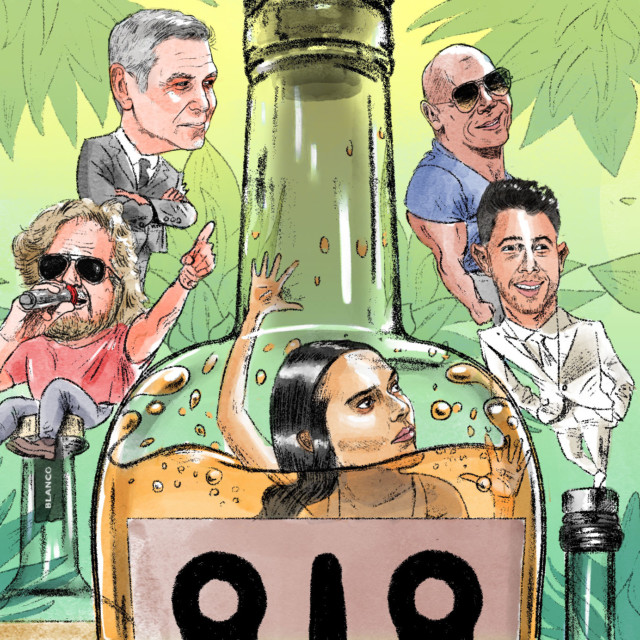This article is part of our Celebrity Tequila series. Read more about the rise of A-lister agave spirits here.
Tequila is soaring in popularity, with sales rising over 6 percent every year since 2002. While some industry reports attribute the spirit’s sudden rise to its alleged health benefits, which are sadly a myth, the category more likely has another mythical force to thank for its spike in sales: celebrities. Starting with Sammy Hagar’s Cabo Wabo in 1996 and gathering widespread attention after the lucrative $1 billion sale of George Clooney’s Casamigos to spirits industry giant Diageo in 2017, celebrity tequila has become a category of its own.
In the past few years, famous names have flocked to the spirit. The likes of Dwayne “The Rock” Johnson, Elon Musk, Shay Mitchell, and Pierce Brosnan hopped on board just last year. And as it turns out, the general public likes its tequila with a side of A-lister. While Elon Musk’s lightning-bolt-shaped Tesla tequila sold out the day of its launch, The Rock’s Teremana has become one of the fastest-growing and most successful spirits brands in history. Meanwhile, Casamigos’ popularity continues to rise, ranking as one of the top-five most trending tequila brands, according to Drinks International.
But recently, the conversation around tequila has shifted. Discussions taking place quietly between bar professionals and among connoisseurs have trickled into the mainstream, and consumers are beginning to question the authenticity (or lack thereof) of non-Mexican celebrities launching definitively Mexican brands. Are they reaping the benefits of agave farms and jimadores in Mexico without giving credit where it’s due?
In February, supermodel and reality television star Kendall Jenner announced she’d be releasing her own tequila brand, 818, in May (The numerical name is a reference not to the area code of Jalisco, Mexico, but to Los Angeles County). But rather than clamor for bottles, this time the public reception wasn’t so positive. Was Kendall Jenner’s 818 announcement the last straw for tequila fans who were harboring previously felt frustrations with cultural appropriation? Or is there more beneath the surface?
When it comes to brand authenticity, (how) can celebrities create agave spirits that are well made, respectful of Mexican culture, and delicious?

Celebrity Tequila: A Man’s World?
As warranted as the criticism against 818 may be, Kendall Jenner is by no means the first non-Mexican celebrity to release a tequila. Many of Jenner’s supporters have pointed out the immense success of non-Mexican, male celebrity-owned tequila brands, and are questioning why Jenner’s launch is any different.
“I thought it was very unfair,” Scarlet Sanschagrin, co-creator of Taste Tequila, a site dedicated to all things tequila, says. “There is a long line of foreigners making tequilas before her — including George Clooney, Sammy Hagar, and Michael Jordan — and they didn’t get that backlash.”
Of course, Jenner’s gender is hard to ignore in this context; in a sea of male-owned and backed brands, hers has received more notable backlash than others. When any woman enters a male-dominated field like that of tequila, she is often criticized. And while other female celebs have released tequilas, like Rita Ora’s Próspero and Shay Mitchell’s sparkling tequila brand Onda, Jenner is the first to actually own her brand (Ora is a partner in Próspero; while Mitchell is the chief brand officer).
“There is a level, of course, of sexism,” says bartender and tequila educator Lucas Assis. “You gotta give it to her that she’s a young woman entrepreneur and she’s making her money. I’m not against that. I just wish she would’ve used her influence in another way.”
On the other hand, when Clooney released Casamigos along with then-business partner Rande Gerber in 2013, neither Gerber nor Clooney had meaningful ties to Mexico or its culture — more attention was instead paid to Clooney’s and Gerber’s steamy ad featuring Cindy Crawford (who is Gerber’s wife) than on cultural appropriation concerns. And when Clooney and Gerber sold the brand to Diageo in 2017, Clooney’s success became the inspiration of more celebrities who followed in his footsteps. Now four years since its sale, Casamigos has still managed to avoid the mainstream backlash that 818 has endured in the few months since its ill-fated Instagram launch announcement earlier this year.
But conversation around cultural appropriation was in its infancy at the time of Casamigos’ launch. Google searches for the term “cultural appropriation” didn’t spike until five years later, in 2018. And by 2019, spirits brands were called out for it in more meaningful ways (including by VinePair). Nowadays, the phrase is well known and often used to point out the many ways in which white celebrities — and (white) people in general — adopt styles, cuisines, speech patterns, and other cultural currency from minority groups without connection to or consideration for their meanings and origins. This is rampant in celebrity culture: From Justin Bieber’s recent dreadlocks, to Gigi Hadid’s blackface, celebrities are called out more and more often for their cultural insensitivities. Some of the biggest offenders? The Kardashian and Jenner families.
Kim and Khloe Kardashian have both sported cornrows on multiple occasions, while Kylie Jenner has been accused of blackfishing — wearing dark makeup and using spray tans to appear much darker than her actual skin tone. Between the older Jenner’s large audience and her family becoming a major (and often Instagrammed) face of the issue, perhaps it shouldn’t shock us that 818 received more criticism than its star-studded predecessors.
In truth, Jenner’s Instagram announcement has a lot to do with the tequila’s cringeworthy launch. What grinds some consumers’ gears about 818 is the video and accompanying caption: “for almost 4 years i’ve been on a journey to create the best tasting tequila … 3.5 years later i think we’ve done it!”
Assis says this rubbed a lot of Mexican tequila producers the wrong way. “I think people don’t realize how important tequila and the agave plant is to the people of Mexico,” he says. “So, I think people took that very personally when she came out and said, ‘We made the best one.’”
818 may not be a great example of female-led tequila, but Assis adds that many women are making authentic (and delicious!) tequila, such as La Gritona, an all-women-operated distillery, and Mijenta, a tequila that is produced by women. ”These are great tequilas, so we should celebrate those,” he says.
https://www.instagram.com/p/CLXIC-VDSVz/
Is There a ‘Right’ Way to Launch a Celebrity Tequila?
With more big names coming out with spirits brands, it’s unlikely that celebrity tequila is going anywhere. So, is there any way for a brand to be celebrity-backed, yet still authentic? “I have yet to see a celebrity brand that appeals to both the aficionado market and the mass market,” Sanschagrin says. Still, she adds, brands don’t necessarily need to be Mexican-owned or even small-production to make good tequila.
The first step celebrities can take is to give proper credit and compensation to the Mexican farmers and distillery workers who are making the tequila. While some brands actually partner with Mexican families to produce their spirits, others are made at large-production facilities that don’t necessarily honor the heritage of tequila-making and often use additives in their products, an immediate red flag to tequila connoisseurs like Assis.
When it comes to respecting the spirit, Sanschagrin emphasizes the importance of traditional production methods. This means “taking the slow process and the time to develop the natural aromas and flavors,” waiting at least five years for agave plants to mature, cooking the agave in brick ovens rather than high-pressure autoclaves, and crush cooked agave with traditional tahonas rather than modern rolling mills.
Focusing on sustainability is also of critical importance. In Jalisco, distillers know that preserving the soil and the agave plant is the most important aspect of its production. Working with and supporting philanthropies like the Tequila Interchange Project, which works to save the bats — a major pollinator of the agave plant — and preserve the soil in Jalisco, is an impactful way for tequila brands, celebrity and otherwise, to support the people of Jalisco and the future of the tequila industry as a whole.
To the people of Mexico, tequila is culture, Assis says: “When people … give respect to those true and cultural ways to make tequila, it is a great way to celebrate the culture instead of exploiting the culture.”

More Than Celebrities?
Though celebrity tequila is an easy category to point fingers at, brand authenticity is by no means an issue that starts and ends with stars. While some of the top tequilas on the U.S. market, such as Patrón and Fortaleza, are additive-free, others are produced at large distilleries that take shortcuts to produce larger volumes of the agave spirit. From using agave that’s not fully matured, to using additives to change the way the tequila tastes, these brands are gradually altering Americans’ perceptions of what traditional, additive-free or authentic tequila really is.
Additionally, as Diageo, Campari, and other multinational parent companies continue to show interest in purchasing these brands, this will encourage more actors, athletes, and wealthy entrepreneurs to get into the game.
Many of us assume that while white American pop culture icons reap the benefits of agave spirits and the farming communities that produce them, those small farms and distilleries are suffering. However, William Erickson, sales and marketing manager of Tequila Fortaleza, one such family brand, says there are some positive aspects to the rise of rich investment in tequila.
“I love that they’re [celebrities are] spending a ton on advertising and getting new people into the market,” Erickson says. Family-owned brands such as Fortaleza, with substantially smaller marketing budgets and social media followings, can be hopeful that these new consumers brought in by celebrities will eventually switch to drinking smaller, more boutique brands as their palates and appreciation for the category evolve.
“Do you choose to support a local restaurant, or do you choose to support a big chain when you go out to dinner? You have that exact same choice in the tequila category,” Erickson says.
Consumers interested in tequila today have resources available to them to make informed decisions. In January, Taste Tequila published a list of brands that belong to the Tequila Matchmaker Additive-Free Program, which distillers can join to promote brand transparency and the commitment to “non-use of additives” including colors, sugars, or extracts.
As of now, no distillery making celebrity tequila has made Taste Tequila’s list. But Sanschagrin welcomes this possibility wholeheartedly. “I hope a celebrity does come along one day, and makes a great tequila and opens up peoples’ eyes to what tequila can be,” she says. “The challenge is on the table.”
Editor’s note (May 25, 2021): This article has been updated to reflect new information learned about Teremana.
